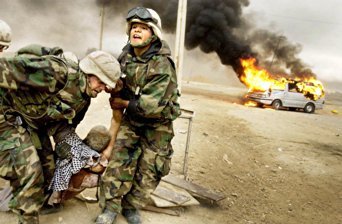Success is not the transition to death by electric drill
It has long been clear to all bar its most stubborn advocates that the invasion and occupation of Iraq has been the mother of all foreign policy disasters. Three years ago this week, President Bush flew on to the USS Abraham Lincoln to announce that "major combat operations in Iraq have ended". In a display of premature triumphalism that quickly came to symbolise the hubris and folly of US policy, the banner over his head declared: "mission accomplished".
But judging failure and holding those responsible to account has been complicated by a lack of clarity about what exactly that mission was. So many justifications for war have been offered that its supporters have found it relatively easy to respond to the collapse of one by seeking refuge in another. It is only comparatively recently that they have run out of places to hide. The WMD case was beginning to unravel even before Bush declared victory. As the most recent US state department report demonstrates, terrorism is a greater threat than ever. There has been no "democratic domino effect" sweeping across the Middle East. And even the claim to have liberated Iraqis from a cruel and despotic regime now seems increasingly forlorn.
The failure to achieve these war aims would be bad enough in view of the enormous cost in blood and treasure, but there is now considerable evidence to suggest that in most respects the invasion has made a bad situation worse.
Click title for full article.
























No comments:
Post a Comment